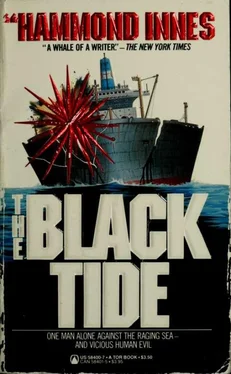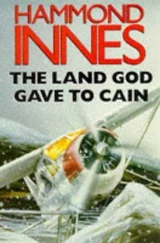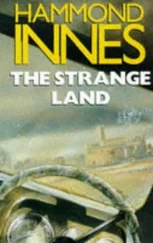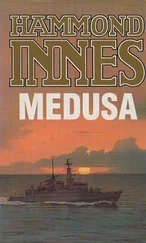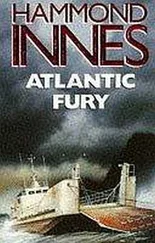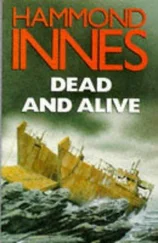Hammond Innes - The Black Tide
Здесь есть возможность читать онлайн «Hammond Innes - The Black Tide» весь текст электронной книги совершенно бесплатно (целиком полную версию без сокращений). В некоторых случаях можно слушать аудио, скачать через торрент в формате fb2 и присутствует краткое содержание. Жанр: Прочие приключения, на английском языке. Описание произведения, (предисловие) а так же отзывы посетителей доступны на портале библиотеки ЛибКат.
- Название:The Black Tide
- Автор:
- Жанр:
- Год:неизвестен
- ISBN:нет данных
- Рейтинг книги:4 / 5. Голосов: 1
-
Избранное:Добавить в избранное
- Отзывы:
-
Ваша оценка:
- 80
- 1
- 2
- 3
- 4
- 5
The Black Tide: краткое содержание, описание и аннотация
Предлагаем к чтению аннотацию, описание, краткое содержание или предисловие (зависит от того, что написал сам автор книги «The Black Tide»). Если вы не нашли необходимую информацию о книге — напишите в комментариях, мы постараемся отыскать её.
The Black Tide — читать онлайн бесплатно полную книгу (весь текст) целиком
Ниже представлен текст книги, разбитый по страницам. Система сохранения места последней прочитанной страницы, позволяет с удобством читать онлайн бесплатно книгу «The Black Tide», без необходимости каждый раз заново искать на чём Вы остановились. Поставьте закладку, и сможете в любой момент перейти на страницу, на которой закончили чтение.
Интервал:
Закладка:
‘What you do here please?’ the man enquired.
‘Are you Portuguese?’
The man hesitated, then shook his head.
‘You’re from that tanker?’
‘Yes.’
‘The Shah Mohammed?’
Again the hesitation. ‘I ask you what you do here?’ he repeated. ‘Why you wait in these islands?’
‘We’re waiting for another yacht to join us. And you — why are you waiting here?’
‘How long before the yacht arrive?’
‘A day, two days — I don’t know.’
‘And when it arrive, where you go then?’
‘The Cape Verde Islands, then across the Atlantic to the Caribbean. Are you the captain of the Shah Mohammed!’
‘No.’
‘Well, tell your captain he came too close last night. I shall, of course, make a report. You tell him.’
‘Please? I don’t understand.’ But obviously he did, for he said something to the man at the wheel and the engine burst into raucous life.
‘What are you waiting here for?’ Saltley yelled to him.
The man waved a hand to the driver and the engine quietened to a murmur. ‘We wait here for instructions. We have new owners. They have re-sold our cargo so we wait to know where we go.’ He leaned his weight on the inflated side of the boat. ‘You in Selvagen Islands before this?’ And when Saltley shook his head, the man added, ‘Very bad place for small ships, Por-toogese fishermen no good. Understand? They come aboard in the night, kill people and throw them to the sharks. Okay?’
‘Do you mean they’re pirates?’ Saltley smiled at him. ‘You understand the word piracy?’
The man nodded. ‘Yes, pirates. That is right. These very perilous islands. You go now. Meet friends at Cape Verde. Okay?’ Without waiting for a reply he tapped the driver on the shoulder. The motor roared,
the bows lifted and they did a skid turn, heading back towards Pequena.
‘What did he mean by pirates?’
Saltley looked round at Mark. ‘A warning probably. Depends whether I satisfied him we were going transatlantic’
That night, just in case, we had two of us on watch all the time. The wind continued to back until it was sou’westerly with a thin cloud layer. Towards dawn the clouds thickened and it began to drizzle. Visibility was down to little more than a mile and no sign of the tanker. After feeling our way cautiously south and west for nearly two hours we suddenly saw broken water creaming round the base of a single rock. This proved to be Ilheus do Norte, the northernmost of the chain of rocks running up from Fora. We turned due south, picked up Selvagem Pequena, skirting the island to the east in thickening visibility.
We wasted more than two hours searching to the south’ard before turning north-east and heading for Selvagem Grande. We were running then in heavy rain and we were tired, so that when we did sight the vague outline of a ship on our starb’d quarter it took us a little time to realize it wasn’t the Shah Mohammed. It was coming up on us quite slowly and at an oblique angle, its shape lost for a moment in a downpour, then reappearing, closer and much clearer. Its hull was black, the superstructure a pale green and the white funnel had a red band and two stars; the same colours as the Shah Mohammed, but there was a difference in the layout, the stern deck longer, the davits further aft
and the derricks were a different shape. I recognized her then. ‘It’s the Aurora B.’ I said, and Saltley nodded, standing in the hatch with the GODCO photographs in his hand.
She was called the Ghazan Khan now, the name painted white on the bow and standing out very clearly against the black of the hull. She passed us quite close, steaming at about eight knots, the grating platform at the top of the lifted gangway plainly visible, the memory of Sadeq standing there firing down at us suddenly vivid in my mind. We altered course to cross her wake and again the name Ghazan Khan was painted on her stern and the port of registry was Basra.
Day Thirty-two and the time 14.47. ‘Well, that’s that,’ Saltley said. ‘AH we need now is a picture of the two of them together.’
We got this just over an hour later, the two tankers lying within a cable’s length of each other a mile or so to the east of Selvagem Grande. We went in close enough for Saltley’s telescopic lens to record the white-painted names on the two fat sterns, then veered off to take shots of the two of them in profile. We didn’t go in close, for the Ghazan Khan had her gangway down and the Shah Mohammed’s high speed inflatable was alongside. They could, of course, be going over the plans for their operation, but it did occur to me they might also be considering what to do about us. We went about and headed southeast for Tenerife, sailing close-hauled into a confused and lumpy sea.
The wind was still backing and as darkness fell Saltley made a near-fatal decision, ordering Pam to
take the wheel and put her about, while the rest of us eased the sheets and got her going at her maximum speed downwind. It was certainly much more comfortable, and though the island of Madeira was further than the Canaries, if the wind continued to back and held in the south all next day it would be a lot quicker, and he needed to get to a telephone as soon as possible.
The course took us to the west of Selvagem Grande and as we picked up the faint glimmer of the light through a mist of rain, I wished Stewart had fitted his yacht with radar. Presuming the tankers had now left for their final destination, I would like to have known what course they were steering. Saltley joined me at the chart table and we discussed it for a while, all the various possibilities, while the aroma of onions assailed us from the galley as Pamela fried up a corned beef hash.
I had the first watch, taking over from Mark as soon as I had finished my evening meal. The course was just west of north, the rain dying away to intermittent showers and the wind almost dead aft so that we were running goose-winged with the main to port and the genoa boomed out to starb’d. Alone at the wheel I was suddenly very conscious of the fact that I was the odd man out. The other four were all part of the yacht, part of the owner’s life, moving in a world entirely different from mine. Through the hatch I could see them sitting over their coffee and glasses of Spanish brandy, talking excitedly. And well they might, for they had the proof they needed.
But what about me? What had I got out of the
voyage? I was back to the uncertainty of that wild accusation, to fear of arrest, perhaps trial and conviction. All very well for Saltley to say that, once the tankers had reappeared, the nature of their operation known, then confirmation of the statements I had made would include acceptance of my version of what had happened to Choffel. But there was no certainty of it and already I was feeling that sense of withdrawal from the others that is inevitable when an individual knows he is destined to take a different path. Brooding over it, sitting at the helm of that swaying, rolling yacht with the wind at my back and the waves hissing past, everything black, except for that lit saloon and Pamela, with her arms bare to the elbows and the polo-necked sweater tight across her breasts, talking animatedly — I felt like an outcast. I felt as though I were already consigned to oblivion, a non-person whom the others couldn’t see.
Ridiculous, of course! Just a part of that accident of birth that had plagued me all my life, drawn to the Middle East yet not a part of it, neither a Christian nor a Moslem, just a lone, lost individual with no real roots. I was thinking of Karen then, my one real lifeline — apart from my poor mother. If only Karen were alive still. If only none of it had happened and we were still together, at Balkaer. In the darkness I could see the fire and her sitting in that old chair, the picture superimposed on and obliterating the lit saloon below. But her face … I couldn’t see her face, the features blurred and indistinct, memory fading.
Читать дальшеИнтервал:
Закладка:
Похожие книги на «The Black Tide»
Представляем Вашему вниманию похожие книги на «The Black Tide» списком для выбора. Мы отобрали схожую по названию и смыслу литературу в надежде предоставить читателям больше вариантов отыскать новые, интересные, ещё непрочитанные произведения.
Обсуждение, отзывы о книге «The Black Tide» и просто собственные мнения читателей. Оставьте ваши комментарии, напишите, что Вы думаете о произведении, его смысле или главных героях. Укажите что конкретно понравилось, а что нет, и почему Вы так считаете.
